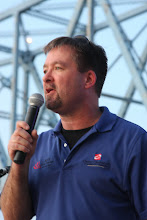It was June of 1990 and I was a TV reporter for WEHT, the then CBS (now ABC) affiliate in Evansville IN. The small town of Petersburg IN had been rocked first by flooding and then a devastating F3 tornado that rolled through town on a Saturday evening killing seven. I covered both events over two long weeks; Indiana Governor Evan Bayh, then 35 years old and barely into his first term, paid a visit to the community to see the damage firsthand.

It was quite the scene at the small Petersburg town hall with TV stations from Evansville, Terre Haute, Indianapolis and other places crowding around Governor Bayh in a back room. I was only 24 at the time, very raw but very passionate about my job. After Bayh made some opening remarks about what he had seen from above on his helicopter ride over town, he took questions from the media. I immediately piped up and chimed in with the first question. Later that day, back at the station our news director was watching the footage with me and expressed surprise that I had been the first to lob a question at the governor. "The first question is usually reserved for the media from the larger markets," I remember him saying. "Good job, that's the way to get after it."
Yesterday, when now Senator Evan Bayh pulled the latest political shocker and announced he would not seek a third term, I remembered that day in Petersburg and how he had taken my question and answered it when cub reporters like me were supposed to wait for "big guys" to ask the first questions. I remembered how Bayh had seemed very likeable, humble and perhaps in office "for the right reasons."
In the almost 20 years since my encounter with Bayh, he forged a reputation as a pretty much unbeatable political icon and was frequently mentioned as a potential vice president or perhaps presidential candidate. He's considered a moderate, a Democrat yes, but someone who can work in a bipartisan fashion to accomplish positive legislation for Americans.
Yesterday, Bayh denounced the brutal partisanship that now grips D.C. Some Republicans like to think he was vulnerable this fall. I don't believe it. With plenty of money in his campaign account and his poll numbers high, I take him at his word that he's fed up with a Congress more concerned with making political points than progress. I viewed conservative Congressman Mike Pence of Indiana—once rumored to be a challenger to Bayh—as having the best chance to give him a strong run. Pence, however, announced weeks ago that he was staying in the House.
A few weeks ago, I opined in this space that bipartisanship was unfortunately a lost concept in politics today. Evan Bayh had come to realize that and now he's stepping away. That's too bad.
 Sure, hate among lawmakers has probably existed since the first Kentucky General Assembly met way back when. I've been bothered more lately, however, by the increasing polarity of the political process in D.C. and Frankfort. The middle ground is not tolerated by the fringe of either party and lawmakers known to understand the word compromise are now targeted by growing segments of their own party for stiff primary challenges.
Sure, hate among lawmakers has probably existed since the first Kentucky General Assembly met way back when. I've been bothered more lately, however, by the increasing polarity of the political process in D.C. and Frankfort. The middle ground is not tolerated by the fringe of either party and lawmakers known to understand the word compromise are now targeted by growing segments of their own party for stiff primary challenges. 

